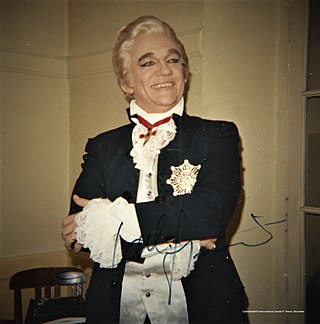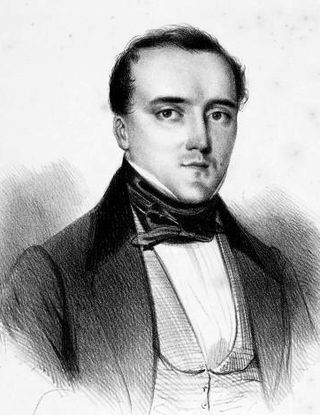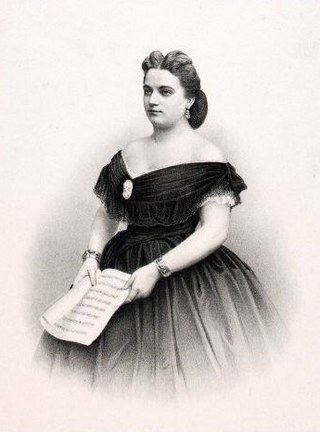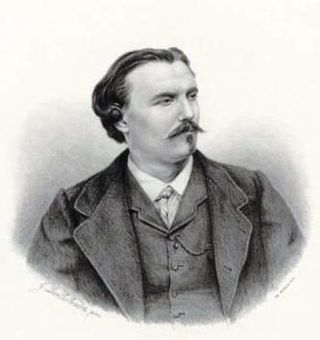
Don Carlos is a five-act grand opera composed by Giuseppe Verdi to a French-language libretto by Joseph Méry and Camille du Locle, based on the dramatic play Don Karlos, Infant von Spanien by Friedrich Schiller. In addition, several incidents, of which the Forest of Fontainebleau scene and auto-da-fé were the most substantial, were borrowed from Eugène Cormon's 1846 play Philippe II, Roi d'Espagne. The opera is most often performed in Italian translation, usually under the title Don Carlo.
A baritone is a type of classical male singing voice whose vocal range lies between the bass and the tenor voice-types. The term originates from the Greek βαρύτονος (barýtonos), meaning "heavy sounding". Composers typically write music for this voice in the range from the second F below middle C to the F above middle C (i.e. F2–F4) in choral music, and from the second G below middle C to the G above middle C (G2 to G4) in operatic music, but the range can extend at either end. Subtypes of baritone include the baryton-Martin baritone (light baritone), lyric baritone, Kavalierbariton, Verdi baritone, dramatic baritone, baryton-noble baritone, and the bass-baritone.

Louis Quilico, was a Canadian opera singer. One of the leading dramatic baritones of his day, he was an ideal interpreter of the great Italian and French composers, especially Giuseppe Verdi. He was often referred to as "Mr Rigoletto" in reference to the Verdi opera. During his 45-year-long career he shared performing credits with opera's greatest stars. He spent 25 consecutive years at the Metropolitan Opera in New York City. After his retirement from the stage in 1998 he continued to perform and record, most often with his second wife, pianist Christina Petrowska Quilico,, with whom he made four CDs. The couple also toured together extensively in concerts until Quilico's death in 2000. Quilico received the Governor General's Performing Arts Award, Canada's highest honour in the performing arts, in November 1999 for his lifetime contribution to classical music.

Paul Lhérie (Lévy), was a French tenor, then baritone, and later a vocal teacher. He was most famous for creating the role of Don José in Bizet's Carmen.

Jean-Baptiste Faure was a French operatic baritone and art collector who also composed several classical songs.

Gabriel Bacquier was a French operatic baritone. One of the leading baritones of the 20th century and particularly associated with the French and Italian repertoires, he was considered a fine singing actor equally at home in dramatic or comic roles and gave regular song recitals. He was a long-term member of the Opéra-Comique and the Paris Opera, but forged a long career internationally at leading opera houses in Europe and the U.S. His large discography spans five decades, and he was considered as “the ambassador of French song”.
Jules Bastin was a Belgian operatic bass who excelled in both serious and comic roles, and left several recordings.
Hector Dupeyron (1861–1911) was a French operatic tenor who had a prolific opera career in Europe from 1887 through 1906. Possessing a powerful and dramatic voice, he particularly excelled in the works of Richard Wagner and Giacomo Meyerbeer.

Mécène Marié de l'Isle was a French musician and opera singer, who used the stage name Marié.

Nicolas-Prosper Dérivis was a French operatic bass. He possessed a rich deep voice that had a great carrying power. While he could easily assail heavy dramatic roles, he was also capable of executing difficult coloratura passages and performing more lyrical parts. Along with Nicolas Levasseur, he was one of the greatest French basses of his generation.

Marie Constance Sasse [Sax, Saxe, Sass] was a Belgian operatic soprano. "Her voice was powerful, flexible, and appealing", and she was one of the leading sopranos at the Paris Opéra from 1860 to 1870. She created the roles of Elisabeth in the Paris premiere of Wagner's Tannhäuser, Sélika in the world premiere of Meyerbeer's L'Africaine, and Elisabeth de Valois in the world premiere of Verdi's Don Carlos.

Jean-Vital Jammes was a French opera singer. During a stage career spanning 40 years, he created many leading baritone roles, including Zurga in Bizet's Les pêcheurs de perles and Ourrias in Gounod's Mireille. Born in Le Passage d'Agen near the town of Agen, he was largely self-taught and made his stage debut in 1841 at the age of 16. After singing in several provincial theatres, he was engaged by the Théâtre Lyrique in Paris and later by the Opéra-Comique. Following his retirement from the stage, Ismaël lived in Marseille where he died at the age of 68.

Jean Morère was a French operatic tenor, active from 1861 to 1871. He created the title role in Verdi's Don Carlos and sang primarily at the Paris Opera and at La Monnaie in Brussels. He was born in Couladère and died in Toulouse at the age of 50.

Marc Bonnehée was a French opera singer who sang leading baritone roles at the Paris Opera (1853–1864) and at the Opéra de Toulouse.

Pauline Guéymard-Lauters was a major opera singer in Paris in the 19th century, creating important soprano/mezzo-soprano roles at the Paris Opera. Her vocal range has been described as “a soprano of wide extension”.

Louis Antoine Ponchard was a 19th-century French operatic tenor and teacher.

Eustase Thomas, known under the stage name Salignac or Thomas-Salignac was a French tenor and lyrical singing professor.
Xavier Depraz, néXavier Marcel Delaruelle was a French opera singer and actor.

Marie-Antoinette Willemsen called Meyrianne Héglon was a Belgian opera singer. After her marriage to the composer Xavier Leroux, she was known as Madame Héglon-Leroux.

Zulmé Dabadie, born Zulmée Leroux and also known as Louise-Zulmé Dabadie, was a French opera singer active at the Paris Opéra, where she sang both soprano and mezzo-soprano roles. Amongst the roles she created were Jemmy in Rossini's William Tell and Sinaïde in his Moïse et Pharaon. Born in Boulogne-sur-Mer and trained at the Conservatoire de Paris, she made her stage debut at the Paris Opéra in 1821 and remained with that company until her retirement from the stage in 1835. After her retirement she taught singing in Paris, where she died at the age of 82. She was married to the French baritone Henri-Bernard Dabadie.
















